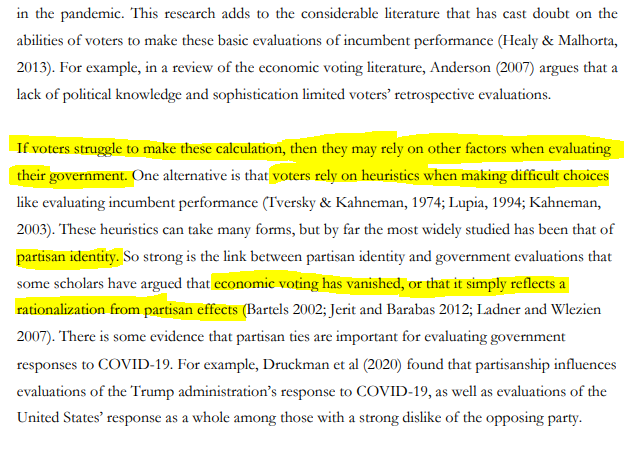1/ Thread on understanding the authoritarian disposition:
The authoritarian mindset is present in ~33% of the population, split roughly equally between right and left.
It is 50% inheritable, 50% from other factors.
The authoritarian mindset is present in ~33% of the population, split roughly equally between right and left.
It is 50% inheritable, 50% from other factors.

3/ Authoritarians prioritise strongly conformity, homogeneity. Loss of "confidence in leaders and institutions" and loss of "shared values". Economic factors (even losing jobs) are far less important to authoritarians than the above two risks.
4/ Authoritarians shun (dismiss) complexity and are drawn to simple solutions. A free press, free speech - necessary components of a liberal democracy become a "problem". For the authoritarian they are overwhelming. 

5/ The authoritarian disposition is apparently a necessary component of human society (watching for threats has at least historically had advantages) - otherwise, considering the 50% heritability, it would no longer be present. But this also implies it can't be "educated" out.
6/ Also: you can't "win arguments" with authoritarians - there is no "winning the argument" on their values, because their values are fixed. (I know "tabula rasa" (Rousseau-influenced) liberals won't like this conclusion but I'm just saying what the data says.)
7/ You can't ignore them democratically either-not only because (considering their geographical distribution and FPTP) you'd lose, but because then you'd have an unstable society - which is what we have now(where ~46-67% of the country who are non-authoritarian are being ignored)
8/ You could argue: "Well, authoritarians are ignoring us so we can ignore them": but that's a false precedent/two-wrongs-make-a-right argument.
This all begs the question: "If you can't persuade them or ignore them, how do you manage a democracy containing them?"
This all begs the question: "If you can't persuade them or ignore them, how do you manage a democracy containing them?"
9/ The emerging conclusion from the Stenner interview is that authoritarians should be managed by not triggering their fear reflexes. Controversially she suggests *not* celebrating diversity.
And don't deliberately push their non-homogeneity buttons like this for example:
And don't deliberately push their non-homogeneity buttons like this for example:

10/ A lot of liberals (including me) have been outraged by the behaviour of tabloids and politicians who prey on authoritarian voters or are genuine authoritarians themselves as if it was some kind of horrific, irresponsible mistake.
11/ But presumably the decision makers in these organisations know their political science (Stenner for example, works for governments outside the academia).
12/ These normative threats (threat to sameness, threats to values, threats to confidence in leaders)... are easy to trigger. They produce massive newspaper sales, clicks, outrage - the outcome is either votes or money or both.
13/ This triggering isn't accidental or "stupid" - it's deliberate, premeditated, calculated. What's more accurate is to say it's immoral, destabilising and results in suffering - even in the authoritarian voter whose anger is triggered by non-existent threats.
14/ As an opposition leader with no air time, or a non-authoritarian newspaper, it's an impossible task to counter-balance the constant stream of triggering from media which profits (or even only survives) financially by triggering authoritarians. (see GB News)
15/ But if your electoral strategy relies on gaining the votes of authoritarians, you either jump on the triggering bandwagon, telling them they are "right to be frightened and angry","yes our leaders are not to be trusted", and "our society is too diverse" or you Win their Trust
16/ The latter is what Starmer attempted but which has seemingly failed (-10% in many polls)
The progressive alliance strategy is to ignore them and win without them.
Johnson's strategy is to play on their fears(*EVERYTHING* is culture war).
The progressive alliance strategy is to ignore them and win without them.
Johnson's strategy is to play on their fears(*EVERYTHING* is culture war).

17/ (The pre-2015 threat to the Tories was the leakage of authoritarians to alternative right wing parties like UKIP. The Tories' solution was to co-opt UKIP strategies of normalising, amplifying and preying on the fears of authoritarians in order to unify the right.)
18/ (Brexit campaign won because the Leave campaign played on *Authoritarian Triggers*: Loss of faith in leaders, condemnation of EU leaders (unelected bureaucrats) no shared values in UK society - progressive revolution, non-homogeneity - immigration, FoM, Turkey joining)
19/ The authoritarian disposition is driving voting preferences now and explains why rolling crises and scandals (inflicted by the government) are not impacting polling. In the face of overwhelming complexity, authoritarians revert to simple identity heuristics:
20/ "Does this government represent my values and my identity? Yes."
preprints.apsanet.org/engage/api-gat…
preprints.apsanet.org/engage/api-gat…

21/ This becomes extremely stark when leave/remain has an indicator is compared with health and economic effects from the pandemic. Leave (i.e. Authoritarian) voters back the government regardless of what the gov has done to the country, to them or to people they know. 

22/ (Their judgement about whether the government has done a good job correlates strongly with whether they voted Leave not whether the government did a good job (measured on covid response - deaths, cases, or economic factors either national or personal).
23/ I guess this just confirms you can't persuade them over to your side whatever happens. It's not a new point in the thread - just proof via a real world example of how bad the problem is.
24/ P.S. I'm grateful to @berkochrissie for posting the Stenner interview - which inspired the above thread.
https://twitter.com/berkochrissie/status/1450008294786048000
25/ Outstanding high quality conversation between @rafaelbehr and @karen_stenner on the authoritarian disposition on the @politicsonthe
"Politics on the couch" podcast.
Loads to talk about here - I really recommend a careful listen:
podcasts.google.com/feed/aHR0cHM6L…
"Politics on the couch" podcast.
Loads to talk about here - I really recommend a careful listen:
podcasts.google.com/feed/aHR0cHM6L…
• • •
Missing some Tweet in this thread? You can try to
force a refresh











